|
The
Korshak Chronicles:
David "The Torch" Korshak (1863-1928)
|
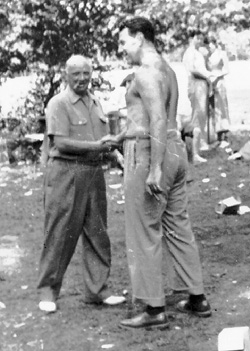 |
Left:
A snapshot of David Korshak with his nephew Sidney. The photo, taken by a family
member, probably dates from the summer of 1927 (David died in May of 1928).
An appropriate caption for this photograph might be "Passing the Torch",
though David's days as a firebug ended more than a decade earlier.
At the time of this snapshot, David was working for the Supreme Malt and Hops
Company on West 61st Street. Sidney was an undergraduate at the University of
Wisconsin. |
Right:
July 13th, 1913---the first mention of the Korshak family in the New York Times.
Chicago papers had been chronicling the involvement of David and Fannie in an
arson-for-profit network since the summer of 1911.
The Times ran another piece on July 29th, 1913 claiming that David the fugitive
had "fled to China". In reality, he was in London. |
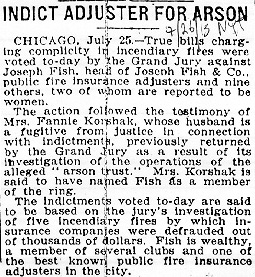 |
Background:
David Korshak's apparently successful career as a hired "torch" abrubtly
ended in June, 1911 when a fire he set at the wholesale clothing firm of Leopond
Dreyfus on South Market Street had unintended consequences.
David successfully burned the building to the ground. But under questioning by
police, Dreyfus admitted that he'd paid for the blaze so he could collect on his
insurance. After confessing, Dreyfus went home and shot himself to death.
In the wake of the Dreyfus suicide, David (dubbed by the Chicago Daily Journal
as "King of the Firebugs"), skipped town to Vancouver. He was arrested
there in August, 1911 and brought back to Chicago where he posted a $3000 bond.
At some point following his formal indictment in September, 1911, David again
fled the country, this time going to London where he would remain until the spring
of 1914.
In David's absence, his wife Fannie (whose maiden name was Brodsky) began handing
authorities a number of tidbits (apparently along with a large measure of disinformation)
which led to the indictment of insurance adjuster Joseph as part of the arson-for-profit
scheme.
Fish had married married to Edna Bensinger, daughter of Moses Bensinger and the
heir, along with her brother Benjamin, to the fortune Moses Bensinger had amassed
as the head of the Brunswick Balke Collander Company (the world's preeminent manufacturer
of bowling balls and pool tables). That an old-line German Jew would have engaged
in an arson conspiracy with immigrant Russian Jews contradicted the conventional
wisdom of the time. But the line Fannie fed the grand jury was apparently convincing.
Fannie also began divorce proceedings against David (citing desertion and habitual
drunkeness) and, believing a decree had been issued, married a tailor by the name
of Isaac Parker (the ceremony was performed in Grand Rapids, Michigan on October
12th, 1912 by Rabbi Zackary Kramer). The divorce, however, had never been finalized---making
Fannie guilty of bigamy, among other things.
David returned to Chicago in April, 1914 after a private detective apprehended
him in London. He surrendered to authorities, was re-indicted and then made a
full confession. In exchange, both he and Fannie were granted immunity from prosecution.
They became the state's principal witnesses when Joseph Fish went on trial in
December, 1914.
David and Fannie resumed their marriage. I have no idea what became of Isaac Parker
the tailor.
If this summary seems more farce than fact, remember that the Marx brothers during
these years lived but three quarters of a mile from the Korshak residence at 4811
South Champlain. |
The
Principals:
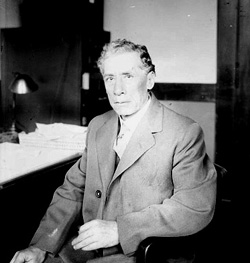 |
Left:
David Korshak on April 30th, 1914 at the Cook County Criminal Courts Building.
In addition to his incendiary practice, David was a saloon keeper and real estate
investor. Additionally, he was a master raconteur who never failed to give the
press good sound bites. (Click here
to read what David told the press on 4/30/1914). |
| Right:
Fannie Korshak in December of 1914 front of the Korshak residence. Joseph Fish
at the time of his indictment described her as a "big, tall Russian Jewess
with theatrical hair...Of course I know of her. Everybody on La Salle Street does.
She's notorious...I knew this Korshak woman's story was coming a month ago. It
was a case of shakedown and I didn't shake." (Chicago Tribune, July 26th,
1913). |
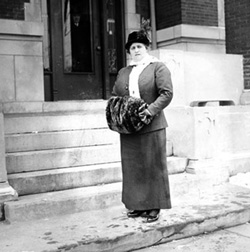 |
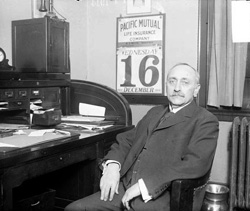 |
Left:
Joseph Fish in December, 1914 during the course of his trial. The press covered
the proceeding like a sporting event.
The jury found him not guilty. Not a surprising outcome, considering that David
and Fannie were the principal prosecution wittnesses.
Character witnesses for Fish included Emil Hirsch, one of the nation's leading
reform rabbis, and advertising mogul Albert Lasker. |
Comments
or suggestions? click
here to send them to Rich Samuels
|